Different Types of Laugh
What sound does a person make when laughing? Or smiling, for that matter? In Japanese there is a plethora of onomatopoeia that correspond to this cheerful facial expression. Some of them you might hear in a conversation, others you will surely find in any manga you pick up. Of course there is the rather international and neutral hahaha ははは, but also many other interesting ones that describe the action with more detail.
The word that is perhaps used the most often is にこにこ nikoniko, which is simply positive and just means smiling in a friendly way. Interestingly, this happens to be the name of a popular Japanese video sharing website, ニコニコ動画 nikoniko dōga (lit. ‘smiley videos’). You might also make the expression a little cutesy by transforming it into にっこり nikkori. Then, if you let go of your inhibitions and smile (or laugh) all the way, in a foolish and thoughtless way, you will be doing へらへら herahera. Going a step further, once you start laughing out loud and roaring with laughter, you are doing からから karakara – or げらげら geragera, which is even more intense and can be translated into English as ‘guffaw’ .
Winding down a little, if you let out a small giggle, you would be doing くすくす kusukusu (which has nothing to do with couscous), or an equivalent of ‘tee-hee’, which is うふふ ufufu.
Sometimes you might feel like laughing but have to hold it in because, e.g., it is the middle of a class and you really should not make a sound. It is difficult to be completely silent in such a situation, though, so you would probably make at least a quiet ぷっ pu-.
Then, there are smiles and laughs that are not straightforward nice. For such times we have にやにや niyaniya, which is a kind of a mean smirk or a suggestive grin. It is also important to remember about the evil ‘mwahaha’, which in Japanese is expressed with くくくっ kukuku, being maybe a little less open-mouthed and quietly sinister than its English counterpart.
This is by no means a comprehensive list, but should cover the most popular vocabulary you might encounter while reading/listening to Japanese. Would you have instinctively known what kind of smile or laugh these words were connected with if you heard them without the context?
Written by AL

